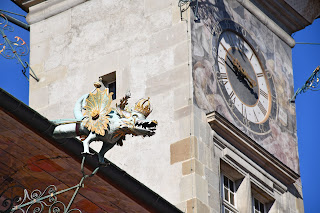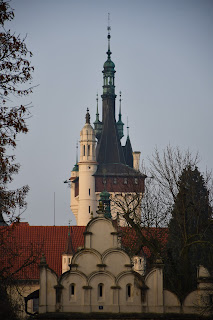Lausanne, Lavaux, and Chateau Chillon
I arrived in Geneva a few days ago to begin my traineeship at the EU delegation to the WTO. I am sure there are a few interesting things to see and do in the city, but with summer drawing its last few breaths, I placed my priorities elsewhere. September is when, after a summer of growing a ripening, the grapes planted on the vineyards above Lake Geneva are finally fit for harvest. Thus, it is a perfect time for hikes along the path snaking its way through Lavaux, one of Switzerland’s most scenic wine regions.
I found a few maps
online of the tourist path leading through Lavaux. Most sites recommend the
stretch between Lutry and Saint-Saphorin, which is precisely the route I decided
to follow. Before I began my hike, however, I decided to stop by Lausanne. The
pause helped me buy a little time while the sun climbed above its harsh matutinal
angle, and I was glad to see a bit of a city that is quite famous despite its relatively
small size (after all, it has a whole treaty named after it!).
From the train
station, I climbed the formidable slope to the Church of Saint Francis, which
seems to lie at the southern end of the old town. I did not go inside but
continued my ascent to the Place de la Palud, which has a quaint townhall with
a large clock and dragon-shaped gargoyles. The centrepiece of the square,
however, is the almost garishly colourful Fountain of Justice, which gazes in
the general direction of the townhall with a sword in one hand and scales in
the other.
Yet more steps – this
time in a timber-roofed staircase – brought me to the city’s cathedral. Its
bizarre gate is well worth a closer look: it features strange monsters, lewd
scenes, and various silly episodes. The interior is much more barren and
unremarkable, though I do not doubt its significance as a structure dating to
the twelfth century. Finally, I stopped by Château St-Maire, a
fifteenth-century structure that has served as the seat of Vaud’s Council of
State for over two hundred years. It is a shame that the building, with its majestic
sandstone base and hefty brick towers, stands at the centre of what has
essentially become a parking lot.
Taking the long way back
to the train station, I absorbed a few more views of Lausanne and admittedly
got a little lost. Nevertheless, I knew that the trains to my next destination ran
on a very frequent schedule and so I paid scant attention to the time. In a
matter of minutes, I was on the train again, this time in the direction of Lutry.
With the sun in my face, I clambered up and down the paved and very clearly
marked path to Saint-Saphorin. The walk even became enjoyable once I whipped
out my umbrella and stopped feeling like a processing prune.
After I arrived in
Saint-Saphorin, I still had some time to spare, so I decided to make another
last stop along the lake at Chillon Castle. One of the most visited castles in
Switzerland, the many-towered fort overlooks Lake Geneva from its base at the
foot of the Alps. Throughout its long history, it belonged to the House of
Savoy, the Bernese, and the Vaudois. It is best known to the English-speaking
world from a work by Lord Byron about François Bonivard, a noble imprisoned at
the castle for his anti-Savoyard activities. The glass casing around Byron’s
signature, etched into a pillar among many others in the castle’s underground
prison, is living testament to the fact that not all graffiti are created
equal.




















































Comments
Post a Comment